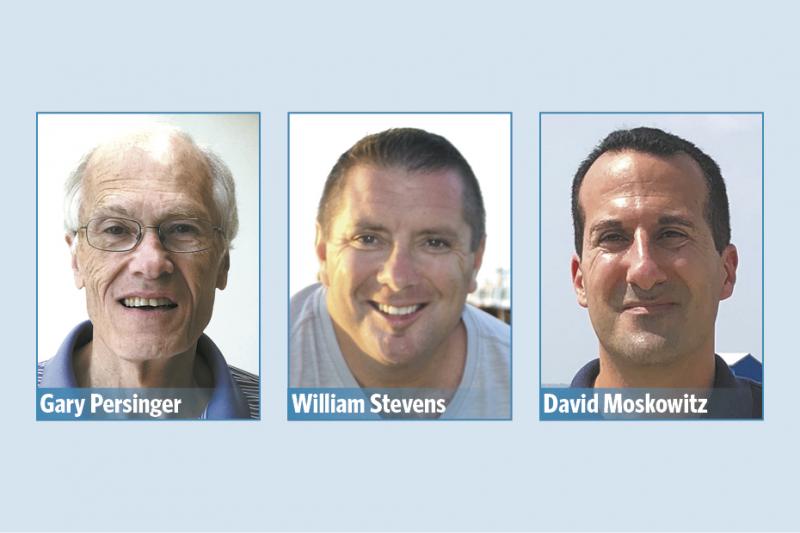Three candidates are running for two seats in Dewey Beach’s 2018 Municipal Election: Commissioner Gary Persinger, David Moskowitz and Bill Stevens.
The election will be held 10 a.m. to 6 p.m., Saturday, Sept. 15, in the Dewey Beach Life Saving Station, 1 Dagsworthy Ave.
Absentee affidavits are available in Town Hall, 105 Rodney Ave, from 9 a.m. to 5 p.m., Monday-Thursday, Sept. 10-13. Absentee voting ends at noon, Friday, Sept. 14.
Absentee voters may also cast ballots 10 a.m. to 2 p.m., Saturday, Sept. 8, in Town Hall.
For more information on the election, contact Dewey Beach Town Hall at 302-227-6363.
Candidates:
Name: David Moskowitz
Age: 41
Occupation: lead financial risk analyst & Dewey Beach investment chair
Relevant experience: My diverse skill set as a CFA/CPA/MBA/MS/SPHR and experience of nearly 5 years volunteering as Dewey Beach investment chair watching over $4.6 million in funds makes me a strong candidate as the inflow of DBE Hyatt/Lighthouse Residences building permit money dries up. This will happen soon as the town’s needs for infrastructure improvements increase. As HOA president, I worked to transform our ocean-block complex on Read Avenue from being in disrepair and having financial troubles with only $300 in the bank to addressing over $500,000 in repairs. See DeweyBeach2018.com for more information.
How long have you owned property in Dewey Beach? More than 5 years
Name: Gary Persinger
Age: 69
Occupation: retired; formerly healthcare legislation and policy research
Relevant experience: elected town commissioner in 2016, current liaison to and former member of comprehensive development plan working group, liaison to budget and finance and investment committees, former member of planning and zoning commission
How long have you owned property in Dewey Beach? More than 30 years
Name: William Stevens
Age: 51
Occupation: Chief financial officer of several entities and owner of insurance company McQuade Consulting
Relevant experience: I have been overseeing the financial operations of entities for over 20 years.
How long have you owned property in Dewey Beach? I purchased my property Jan. 30, 2017, after renting for the summers since 2011.
Questions
How can Dewey Beach fund flooding and stormwater management infrastructure?
DM: After deciding to run, I reached out to the Center for the Inland Bays to get their feedback. They have prepared a master plan of potential upcoming projects for Dewey Beach. I will ask the infrastructure committee to have the projects assigned priorities so we understand the must-dos, the nice-to-haves and the cost. The town manager can work with Center for the Inland Bays to apply for grants. If we can get a grant for the projects, the costs can be reduced substantially. With the rental tax bringing in $500,000 a year more than a few years ago, Dewey has potential funding.
GP: We need a dedicated source of funding but must have public input on the source and acceptable level of burden. Section 93-2 of the Town Code requires 20 percent of building permit fees be reserved for infrastructure needs. This set-aside is not included in and must be restored to the current budget as a prerequisite to proposals for increasing revenues. Existing stormwater management research and available state or federal funds are essential considerations. New revenue sources to be considered include a dedicated infrastructure tax, an addition to the beach tax allocated for infrastructure needs, or additional visitor-based revenue sources.
WS: I would look to develop funding of flooding and stormwater management infrastructure through grants and charitable contributions.
Are you satisfied with the TGM report on the use of the military surplus program? Should Dewey continue to investigate town participation in it?
DM: No. Eight officers got 24 ATVs, 22 vehicles and 6 boats for open-water search and rescue, not their jurisdiction, or the nonexistent firing range. Some equipment stored at a home was sold for cash. The previous town manager stated his signature was forged on a letter allowing the program. The report assigned items 20 percent of their acquired value, and excluded 99 percent of items and items below $5,000. Management edited the Phase II report before the audit committee received it, the opposite of what happened with Phase I. An audit is necessary. This and the four material findings could impact the town’s ability to get loans or grants.
GP: On Aug. 10, I proposed that the town manager work with the police to determine those surplus items for which there is a specific, identifiable and demonstrable need and to dispose of those items for which need cannot be shown. Over the next eight months, inventory not meeting the need test must be appropriately disposed of and any revenues generated accounted for. Commissioners must be kept informed with documentation and involved at key decision points. This process will involve all inventory, not just those items considered by TGM, and must provide additional accountability and reduce uncertainty about this equipment.
WS: I am satisfied with the TGM report. Following the recommendations of the auditors will ensure proper reporting. The program has provided inexpensive equipment and has saved the town money and should be continued.
Would a permanent revenue stream such as real estate taxes benefit town residents?
DM: A few years ago the town instituted a rental tax which brings in $500,000 a year and in every year but one, it has increased. The transfer tax may vary depending on the economy, but that’s why you should set aside a portion during good times for bad times. There is no reason to have a property tax with all the recent inflows; you just need proper budgeting and to minimize all the lawsuits that are drying up town coffers.
GP: New revenues will be needed, but they should be targeted to specific needs, infrastructure for example. A general property tax provides too much discretion in deciding how revenues are spent, and the budget process, although public, is not sufficiently broad based to gain public input effectively on spending priorities. Real estate taxes often are based on current property values, and as values rise, so do taxes. In recent years, we have enjoyed budget surpluses and put money aside for future needs, and that is where we should begin assessing the prospects for our current revenue streams and future requirements.
WS: While real estate taxes would be beneficial, it is obviously not a popular idea. Permanent revenue streams need to be drawn from homeowners, guests and businesses.
Is hiring new personnel necessary to improve internal controls and accountability?
DM: People talk status quo or do everything. There is in-between where you take steps to improve controls and prevent conflicts of interest. Have a robust audit and internal controls committee. That committee will be tasked with holding an RFP for a new auditor because rotation is a normal and good practice and for coming up with a package of internal controls for the commissioners to pass. Once passed, the town manager will be tasked with implementing them. Every year at the annual audit, the controls will be reviewed and the town manager responsible if such controls are not implemented properly.
GP: I proposed and commissioners agreed in August that the town manager should take action to develop a formal accounting procedures and policy handbook with specific focus on internal controls, including accountability related to cash and property/capital assets. In February, commissioners approved engagement of an accounting firm with the assumption that this would be a cost-effective way of ensuring timely, accurate and transparent financial reporting. We have tasked the town manager to revisit this decision, consult with the auditors and ensure that it provides a better solution for ensuring well-controlled accounting practices than hiring additional staff.
WS: I believe we have the right personnel in place. Through the application of the controls recommended by the audit committee and the improvement of communication, we can continue to build trust and promote a platform of transparency.





















































